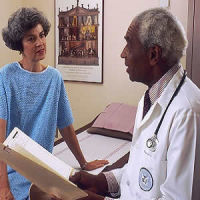A November 2017 study published in the Journal of the American Heart Association highlights a lack of needed preventive care for HIV-positive patients at risk for heart disease and stroke. In particular, the study found that patients living with HIV were much less likely to have a doctor prescribe aspirin or cholesterol-lowering medications than were patients who were HIV-negative.
Although the study didn’t address why doctors were not following prevention protocols, investigators suggested that because some primary care doctors have only a limited amount of time to see a patient, they are likely to focus more on treating the HIV than following the guidelines.
Internist Dr. Joseph A. Ladapo, the lead author of the study, treats HIV-positive patients at the Ronald Reagan UCLA Medical Center. He said he’d had a sense that many of his patients weren’t getting the preventive care they needed to reduce their risk of a heart attack or stroke. The findings, he said, show “just how poor of a job we do as doctors in helping our patients reduce the risk of heart disease.”
HIV and cardiovascular disease researchers have known since the early days of the AIDS epidemic that people living with HIV were at risk of developing heart disease or experiencing a stroke. However, as cardiologist Dr. Tomas G. Neilan, director of cardio-oncology at Massachusetts General Hospital in Boston noted, clear cardiovascular care protocols for HIV-positive patients have yet to be developed.
The absence of guidelines, Dr. Neilan said, is striking because cardiovascular disease in HIV-positive patients is probably not as strongly related to the virus as it is to a combination of factors, such as inflammation related to HIV, the antiretroviral therapies used to treat the virus, and the commonness of high blood pressure and other conditions that may lead to heart disease and stroke.
The JAHA study supports previous research findings. A 2012 study, for example, found that fewer than one in five HIV patients at risk for heart disease and stroke was told that taking a daily aspirin could reduce this risk.
Infectious disease specialist Dr. David N. Schwartz, chair of the division of infectious diseases in the Cook County Health & Hospitals System in Chicago, said that when treating patients with HIV, the initial concern is getting the virus under control. But in older patients, he said, attention must also be paid to high blood pressure, diabetes and other conditions that can increase their risk of heart disease and stroke. Dr. Schwartz said one of his biggest challenges is getting HIV-positive patients to address these other aspects of their health.
Until the mid-1990s, most people with HIV died relatively quickly of an AIDS-related illness. But as treatments have improved, that’s changed. Today, it is not uncommon for doctors to have HIV-positive patients who are in their 50s and 60s, or even in their 80s. According to the Centers for Disease Control and Prevention, in 2015 (the most recent year for which statistics are available) there were more than 970,000 people in the U.S. living with HIV, and nearly half were over 50.
Rob Quinn, an HIV-positive patient, was living in rural Massachusetts when he was diagnosed to have cardiomyopathy, a condition in which the heart muscle gets larger or thickens. After the diagnosis, he moved to Boston, where he hoped to find a cardiologist with experience treating HIV-positive patients with heart disease.
“The journey has not been easy,” said Quinn of his struggles with health problems that have included AIDS, alcohol abuse, and Kaposi sarcoma, an AIDS-related cancer. The 58-year-old child development specialist said getting his health on track was often difficult because the doctors he saw didn’t have experience treating HIV-positive patients with heart disease.
Quinn said his experience taught him he must be in control of his health care. He encourages others living with HIV to be assertive when dealing with their doctors, to ask questions, learn their family health history, listen to their bodies — and be vigilant about their risk for heart disease and stroke.
Image Credit: Pixabay
Latest Articles
HIV, cardiovascular disease, HIV patients
Study examines HIV patients with cardiovascular risk



























